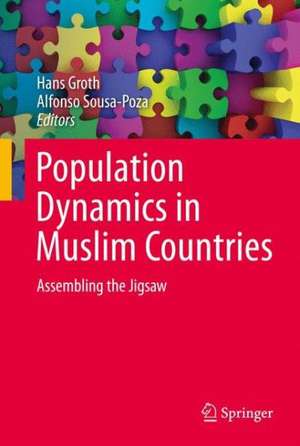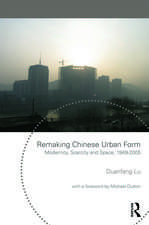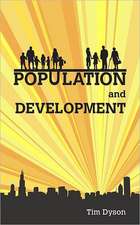Population Dynamics in Muslim Countries: Assembling the Jigsaw
Editat de Hans Groth, Alfonso Sousa-Pozaen Limba Engleză Paperback – 13 apr 2014
| Toate formatele și edițiile | Preț | Express |
|---|---|---|
| Paperback (1) | 644.82 lei 6-8 săpt. | |
| Springer Berlin, Heidelberg – 13 apr 2014 | 644.82 lei 6-8 săpt. | |
| Hardback (1) | 651.19 lei 6-8 săpt. | |
| Springer Berlin, Heidelberg – 28 mar 2012 | 651.19 lei 6-8 săpt. |
Preț: 644.82 lei
Preț vechi: 758.60 lei
-15% Nou
Puncte Express: 967
Preț estimativ în valută:
123.39€ • 134.45$ • 103.97£
123.39€ • 134.45$ • 103.97£
Carte tipărită la comandă
Livrare economică 23 aprilie-07 mai
Preluare comenzi: 021 569.72.76
Specificații
ISBN-13: 9783642434112
ISBN-10: 3642434118
Pagini: 388
Ilustrații: X, 378 p.
Dimensiuni: 155 x 235 x 20 mm
Greutate: 0.54 kg
Ediția:2012
Editura: Springer Berlin, Heidelberg
Colecția Springer
Locul publicării:Berlin, Heidelberg, Germany
ISBN-10: 3642434118
Pagini: 388
Ilustrații: X, 378 p.
Dimensiuni: 155 x 235 x 20 mm
Greutate: 0.54 kg
Ediția:2012
Editura: Springer Berlin, Heidelberg
Colecția Springer
Locul publicării:Berlin, Heidelberg, Germany
Public țintă
ResearchCuprins
Introduction and Overview.- Topics and Issues.- Country and Regional Studies.- Policy Implications.- Statistical Annex.- Biographical Sketches.
Notă biografică
Hans Groth, MBA is Senior Director of Healthcare Policy & Market Access for the Oncology Business Unit from Pfizer Europe and Member of the Executive Board for Pfizer Switzerland. He has been working with Pfizer for twenty-four years and has comprehensive experience in over 30 healthcare markets including Western Europe, Eastern Europe, the USA and Canada. His responsibilities have included medical affairs, clinical research, regulatory, marketing & sales as well as international public affairs including negotiating pricing and access conditions with government authorities as well as healthcare payers. In 2003, he was appointed "Pfizer Global Health Fellow" by UNAIDS to conduct case studies in Central Asia and Siberia in order to quantify the threat potential of HIV/AIDS/TB in that region. For his subsequent commitment towards supporting public health infrastructure projects in Southeast Siberia and Kirgizstan, he received in 2008 the "Pfizer Global Health Fellow Award". For the past ten years, Hans Groth has been studying the interaction between global demographic change, economic development, wealth and societal stability. The focus of his research has built upon theories of economic development & productivity and employing the value of health as a sustainable tool to unlock new ways to tackle the imminent challenges of demographic change. His numerous publications as books, position papers and newspaper articles can be downloaded from www.demographic-challenge.com Since 2009, Hans Groth has worked as a guest lecturer at the University of St. Gallen/Switzerland with the topic "Megatrend: Global Demographic Change". He is also Chairman of the Board of the Demographic & Ageing Forum (WDA) at the University of St. Gallen and elected member of the "Global Agenda Council on Global Population Growth" for the World Economic Forum (WEF).
Alfonso Sousa-Poza holds a Professorship in Economics at the University of Hohenheim in Stuttgart (Germany), and is a Director at the Institute for Health Care & Public Management. He is also a lecturer in economics at the University of St. Gallen (Switzerland), Secretary of the foundation of the World Demographic & Ageing Forum (Switzerland), and a Research Fellow of the Institute for the Study of Labour (Germany). Alfonso Sousa-Poza studied computer science at the University of Cape Town, and economics at the University of St. Gallen in Switzerland, from which he obtained his PhD in Economics in 1999. From 1996 until 2007 he was employed at the Research Institute for Labour Economics and Labour Law at the University of St. Gallen, and served as Executive Director of the WDA Forum between 2005 and 2009. His primarily empirical research interests are in the fields of time allocation, wage determination, retirement, migration, working time, subjective wellbeing, and health outcomes. He is a regular consultant to governments and international organisations on issues related to demographic change, including the European Commission and the OECD.
Textul de pe ultima copertă
The book discusses the demographic changes in Muslim countries. It thereby focuses on topics such as the demographic dividend and the demographic transition, labour market challenges, health care, universal education and gender issues. These challenges are addressed at a country level and include policy implications for the large majority of the Muslim countries covered in this book. Moreover, political consequences for Europe with respect to the integration of Muslims are presented to the reader.
Caracteristici
All relevant information about ongoing demographic changes in Muslim countries included Up-to-date research on the topic Provides important policy implications for Europe with respect to the integration of Muslims Includes supplementary material: sn.pub/extras

















